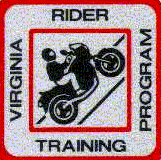Motorcycle RiderCourse
www.Learn2Ride.com

The Motorcycle RiderCourse: Riding and Street Skills is a complete
course of instruction for street riders of all ages. It is presented in
a variety of instructional settings: community colleges, universities,
vocational schools, military establishments, adult education programs,
community programs, high schools, motorcycle clubs and others.
Weather you are a first time rider or a former rider that is returning to motorcycling
after a long break, you need professional training to deal with today's traffic. The
Virginia Rider Training Program is pleased to offer the Motorcycle RiderCourse
Riding and Street Skills (MRC/RSS) to help prepare you for the thrill of motorcycling.
The MRC/RSS assumes no prior knowledge of motorcycling. The classroom lecture
begins with an overview of the course, types of motorcycles, motorcycle controls and
protective gear. The riding portion of the course first concentrates on the four
basic riding skills: straight-line riding, turning, shifting, and braking. After the
basics, the course studies street riding strategies, hazard avoidance, advanced
turning, maximum braking, and handling special riding situations. Finally, the
MRC/RSS examines the effects of alcohol and other drugs on competent operation of a
motorcycle.
The MRC/RSS is a physically demanding course. It is taught over the course of
an entire weekend and requires the student to pass both a written and a riding-skills
test. A completion card is awarded upon successful completion of the MRC/RSS. This
completion card exempts the student from the riding portion of Virginia's DMV license
test and may entitle the student to a reduced rate on insurance.
We will supply all students with a training motorcycle, a DOT-approved helmet, and all
training materials. Students may (and are encouraged to) use their own DOT-approved
helmet (if they have one) but students must use our motorcycles.
Enrollment Eligibility
Students enrolling in a rider training course should possess either a valid
automobile driver's license, or have successfully completed a basic driver
education program. Other enrollment requirements include:
- Parental permission (depending on the age of the student).
- Near legal riding age.
- Ability to ride a bicycle (balance).
- Completion of a waiver form.
All students and instructors wear protective gear when riding during the
course, to include:
- Helmet and eye protection.
- Over-the-ankle footwear (not cloth, canvas, etc.).
- Long-sleeved shirt or jacket.
- Long non-flare denim pants or material of equivalent durability.
- Full-fingered gloves, preferably leather.
Professional Standards for Training
The professional standards established for teaching the Motorcycle RiderCourse:
Riding and Street Skills were created to help ensure that motorcycle
safety education is presented in a safe, efficient and professional manner.
It is the Motorcycle Safety Foundation's belief that high training standards
applied in a professional manner can foster expansion and growth of safe
motorcycling.
The range training facility is free from pedestrian, animal or vehicle
traffic. The pavement is suitable for riding maneuvers such as sharp turns,
braking and safe vehicle travel. The surface provides good traction. There
are no obstacles that present an unsafe environment. The range is correctly
laid out to meet curriculum and safety standards.
The RiderCourse: Riding and Street Skills is presented with materials
supplied by the Motorcycle Safety Foundation (MSF) as a public service.
This does not imply any endorsement by MSF of the sponsor or any other
sponsors, supporting organizations, equipment, motorcycles or other materials
involved in the presentation of a RiderCourse. Our aim is to expose students
to ways to ride more safely. While we cannot and will not assume responsibility
for the safe operation of your motorcycle, it is our hope that by presenting
responsible viewpoints on safety we will expose riders and the general
public to proper and prudent motorcycle operation. We're here to assist
your learning, we cannot guarantee it or put it to use.
Back to Virginia Motorcycle RiderCourse Homepage
Send E-mail to: webmaster@learn2ride.com
Last revised: July 4, 2002

